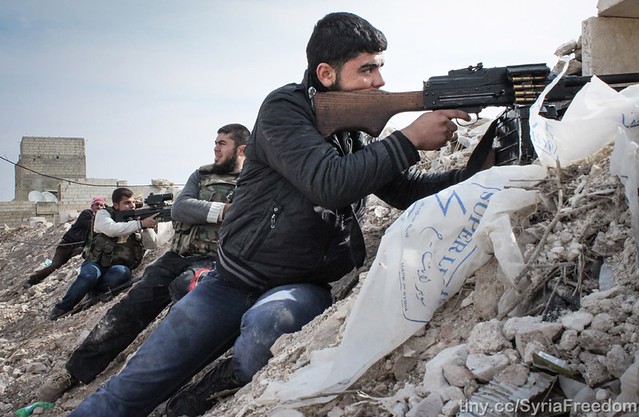Last Thursday President Obama sent a request to congress to authorise $500 million to train and equip ‘moderate’ Syrian rebels.
The request is a significant development in US involvement in the Syrian civil war, which has already claimed an estimated 162,000 lives.
The funding request is part of the $1.5bn Regional Stabilisation initiative, established to provide assistance to Syria’s neighbours including Jordan and Iraq; where The Islamic State in Iraq and the Levant (Isis) last week claimed the establishment of a single Islamic state across territories in Jordan and Syria.
If approved, the funding will be a step closer to direct and public American intervention into the Syrian war. It has been reported that the CIA has been covertly training moderate rebels in Jordan, providing them with limited arms.
As yet however there is no detail given, regarding the targets of the training or the how the programme will work.
Undoubtedly the programme will face the same issues as those which have been encountered in the past. In Iraq and Afghanistan a lack of literacy among trainees became a barrier to the success of similar programmes, a problem especially prevalent in ‘training to train’ schemes
Crucially however, it is unclear how ‘moderate’ rebels will be selected and vetted to partake in the training. The wording is vague and the methods even more so. The CIA says it has been vetting those with whom they co-operate for a considerable length of time, however the methods and results of this process are yet to become apparent.
These arguments should be enough to second guess the chosen actions of the US government, however increasingly volatile and unpredictable situation in Syria has resulted in a separate wave of criticism against the proposed programme.
The Syrian opposition, in a moment of apparent internal political turmoil, fired its military council only to reinstate them shortly after. The actions, allegedly taken on the basis of corruption and a leadership struggle, cast further doubt over the reliability of those the US has chosen to support in the conflict.
History is not kind to American interventionism. In the 1980’s the US supported the Mujahedeen in Afghanistan, a decision for which it still receives criticism. The support provided is said to have influenced, and part-funded, Al Qaeda in the region. At the time, Pakistan’s head of state Benazir Bhutto, referring to Islamic extremism, told President George Bush Snr, "You are creating a Frankenstein."
However, in relation to Syria the concern about weapons falling into the wrong hands has apparently been disregarded a price worth paying. This is naive; the long lasting implications of stoking the fires of war are unpredictable and dangerous.
The situation in Syria in complex, volatile and carries huge significance both or the region and globally. The UN, in a number of diplomatic negotiations - most notably those led by Kofi Annan and Lakhdar Brahimi respectively, has failed. With no international mandate, America is once again going it alone to protect its own, but at what price for the rest?
The request is a significant development in US involvement in the Syrian civil war, which has already claimed an estimated 162,000 lives.
The funding request is part of the $1.5bn Regional Stabilisation initiative, established to provide assistance to Syria’s neighbours including Jordan and Iraq; where The Islamic State in Iraq and the Levant (Isis) last week claimed the establishment of a single Islamic state across territories in Jordan and Syria.
If approved, the funding will be a step closer to direct and public American intervention into the Syrian war. It has been reported that the CIA has been covertly training moderate rebels in Jordan, providing them with limited arms.
As yet however there is no detail given, regarding the targets of the training or the how the programme will work.
Undoubtedly the programme will face the same issues as those which have been encountered in the past. In Iraq and Afghanistan a lack of literacy among trainees became a barrier to the success of similar programmes, a problem especially prevalent in ‘training to train’ schemes
Crucially however, it is unclear how ‘moderate’ rebels will be selected and vetted to partake in the training. The wording is vague and the methods even more so. The CIA says it has been vetting those with whom they co-operate for a considerable length of time, however the methods and results of this process are yet to become apparent.
These arguments should be enough to second guess the chosen actions of the US government, however increasingly volatile and unpredictable situation in Syria has resulted in a separate wave of criticism against the proposed programme.
The Syrian opposition, in a moment of apparent internal political turmoil, fired its military council only to reinstate them shortly after. The actions, allegedly taken on the basis of corruption and a leadership struggle, cast further doubt over the reliability of those the US has chosen to support in the conflict.
History is not kind to American interventionism. In the 1980’s the US supported the Mujahedeen in Afghanistan, a decision for which it still receives criticism. The support provided is said to have influenced, and part-funded, Al Qaeda in the region. At the time, Pakistan’s head of state Benazir Bhutto, referring to Islamic extremism, told President George Bush Snr, "You are creating a Frankenstein."
However, in relation to Syria the concern about weapons falling into the wrong hands has apparently been disregarded a price worth paying. This is naive; the long lasting implications of stoking the fires of war are unpredictable and dangerous.
The situation in Syria in complex, volatile and carries huge significance both or the region and globally. The UN, in a number of diplomatic negotiations - most notably those led by Kofi Annan and Lakhdar Brahimi respectively, has failed. With no international mandate, America is once again going it alone to protect its own, but at what price for the rest?




No comments:
Post a Comment